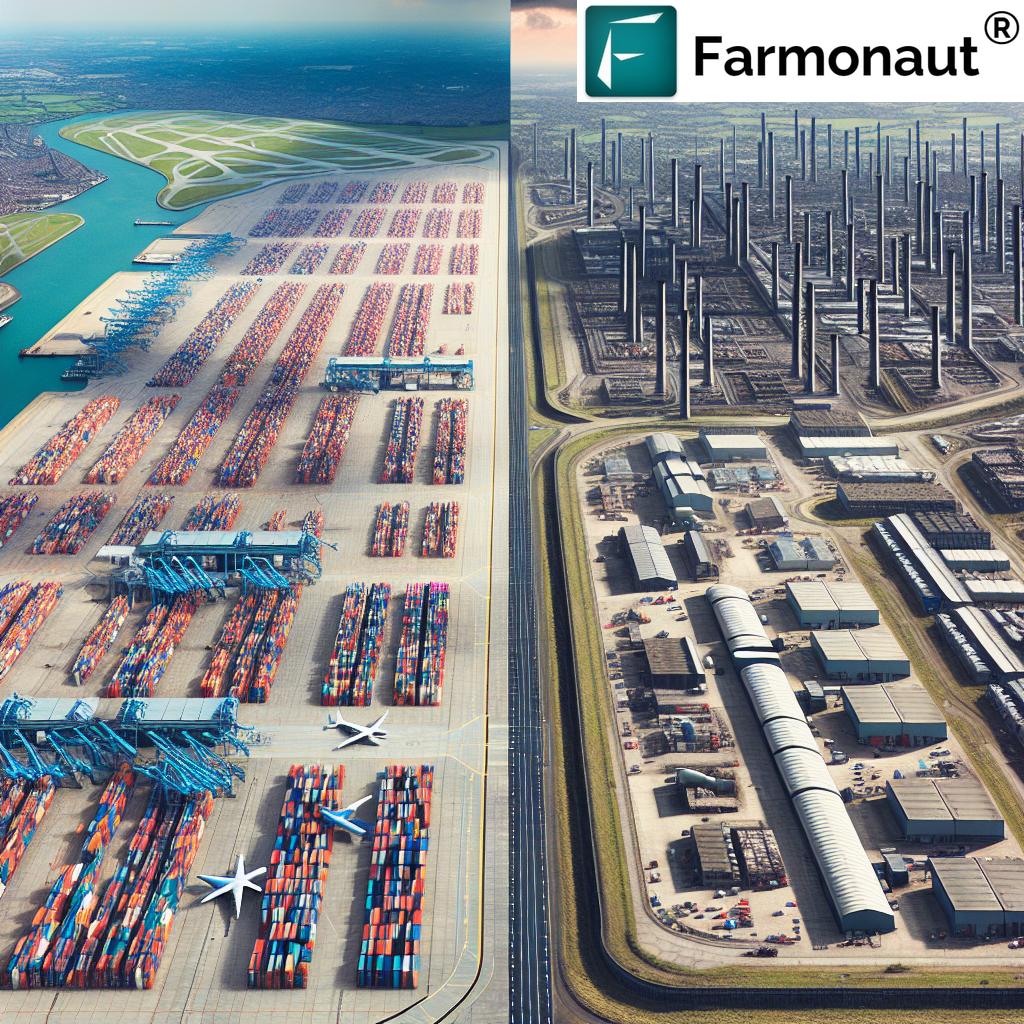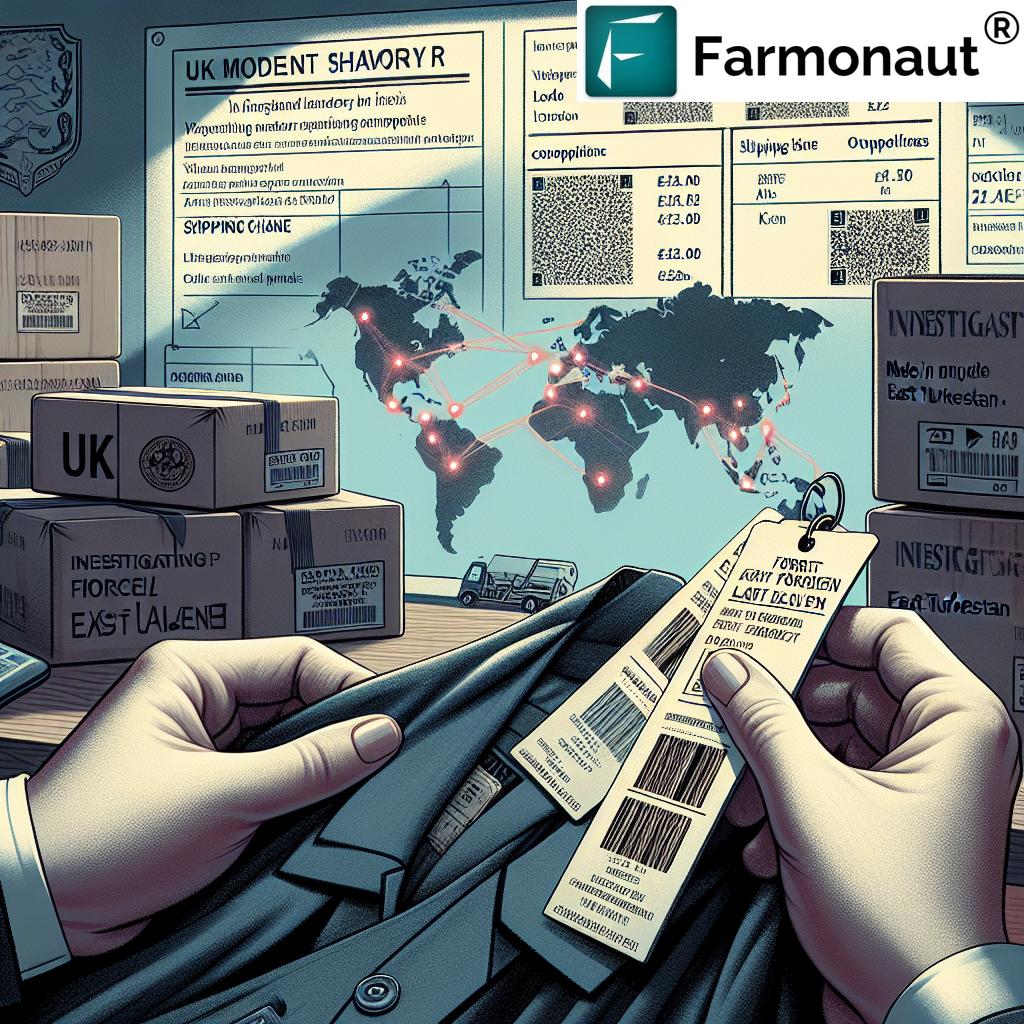UK Government Urged to Investigate New East Turkestan Cargo Flights Amid Forced Labour Concerns
“Since summer 2024, three direct air cargo routes have been established from East Turkestan to major British airports.”
“Since summer 2024, three direct air cargo routes have been established from East Turkestan to major British airports.”
In recent months, we have witnessed a growing concern over the establishment of new cargo flights connecting East Turkestan to major British airports. These developments have sparked intense debate and scrutiny, particularly regarding the potential implications for human rights and forced labour issues. As we delve into this complex topic, it’s crucial to understand the various facets of this situation and its potential impact on UK businesses, consumers, and international relations.
The Rise of New Cargo Routes: A Cause for Concern
Since the summer of 2024, three direct air routes have been established between East Turkestan and major UK airports. This significant development coincides with the increasing popularity of Chinese e-commerce platforms in the British market. While these new routes may seem like a boon for international trade and commerce, they have raised serious questions about the ethical sourcing of goods and compliance with the UK’s Modern Slavery Act.

The establishment of these routes has not gone unnoticed by human rights advocates and government officials. David Alton, chair of the British Parliament’s cross-party human rights committee, has taken a proactive stance on this issue. In a letter addressed to Home Office Minister David Hanson, Alton expressed his deep concerns about the potential for these new flight routes to facilitate the import of goods linked to forced labour into the UK.
Understanding the Uyghur Forced Labour Issue
To fully grasp the gravity of this situation, we must first understand the context of forced labour concerns in East Turkestan, particularly concerning the Uyghur ethnic group. The Uyghurs, predominantly Muslim and culturally distinct from China’s Han majority, have been subjected to widespread human rights abuses in recent years. Reports from various international organizations and human rights groups have documented systemic exploitation of Uyghurs in various sectors, including manufacturing and agriculture.
The term “Uyghur forced labour” refers to the coerced employment of Uyghur individuals in hazardous working conditions across multiple industries. This exploitation is part of a broader pattern of human rights violations targeting the Uyghur population, which has drawn significant international condemnation and scrutiny.
The Role of E-commerce and Supply Chain Ethics
The emergence of these new cargo routes coincides with the rapid growth of Chinese e-commerce platforms in the UK market. This convergence raises critical questions about the ethical sourcing of goods and the transparency of supply chains. As British consumers increasingly turn to these platforms for their shopping needs, there’s a growing necessity to ensure that the products they purchase are not tainted by human rights abuses.
Two major players in this scenario are Titan Airways and European Cargo, both of which have launched direct flights from East Turkestan to various UK airports. Titan Airways now operates flights to London every one to two days, while European Cargo has commenced services to Cardiff and Bournemouth. A notable flight in October 2024 saw European Cargo transporting 59 tons of goods to Cardiff, underscoring the scale of these operations.
Both airlines have publicly stated their compliance with the UK’s Modern Slavery Act, which mandates that companies take necessary measures to prevent and report instances of forced labour within their supply chains. However, the rapid expansion of these direct cargo flights has intensified concerns about the transparency and accountability of the involved supply chains.
The UK Government’s Role and Responsibilities
As pressure mounts on the UK government to investigate these new cargo flights, we find ourselves at a critical juncture where immediate action is crucial. The government’s response to this situation will have far-reaching implications not only for international trade but also for the UK’s stance on human rights and ethical business practices.
The calls for a government inquiry highlight the urgent need for greater vigilance and transparency in supply chains, particularly concerning products originating from areas known for human rights abuses. This situation presents an opportunity for the UK to reinforce its commitment to upholding human rights and ethical trade practices on the global stage.
International Labor Rights Scrutiny
The issue of forced labour in East Turkestan has garnered significant attention from international labor rights organizations. These groups play a crucial role in monitoring and reporting on human rights abuses in supply chains. Their findings and recommendations often inform government policies and corporate practices, making their scrutiny of these new cargo routes particularly significant.
As we navigate this complex issue, it’s essential to consider the role of technology in monitoring and ensuring ethical supply chains. Innovations in satellite imagery, blockchain, and AI can provide powerful tools for tracking the origin and journey of goods, potentially offering solutions to some of the challenges we face.
“The rise of Chinese e-commerce platforms in the UK coincides with new cargo flights, potentially impacting millions of consumers.”
The Impact on UK Businesses and Consumers
The establishment of these new cargo routes and the associated concerns have significant implications for UK businesses and consumers. Companies operating in the UK must now be more vigilant than ever in ensuring their supply chains are free from forced labour. This may require additional due diligence, potentially increasing operational costs but ultimately contributing to more ethical business practices.
For consumers, this situation underscores the importance of making informed purchasing decisions. As awareness grows about the potential links between everyday products and human rights abuses, there may be a shift towards more ethically sourced goods. This could lead to changes in consumer behavior and increased demand for transparency from retailers and e-commerce platforms.

The Role of Technology in Addressing Forced Labour Concerns
In addressing the complex issues surrounding forced labour in supply chains, technology can play a crucial role. Advanced solutions like those offered by Farmonaut, while primarily focused on agriculture, demonstrate how technology can bring transparency and accountability to various industries.
Farmonaut’s blockchain-based traceability solutions, for instance, showcase how technology can be leveraged to ensure transparency in supply chains. While Farmonaut’s focus is on the agricultural sector, similar principles could be applied to track the origin and journey of goods from East Turkestan, potentially helping to identify and prevent the importation of products linked to forced labour.
Explore Farmonaut’s innovative solutions:
The Way Forward: Balancing Trade and Human Rights
As we confront the challenges posed by these new cargo routes, it’s clear that a multifaceted approach is necessary. This approach should involve:
- Thorough government investigations into the new cargo routes and their potential links to forced labour
- Enhanced due diligence requirements for companies importing goods from high-risk regions
- Increased collaboration between government bodies, businesses, and human rights organizations
- Investment in technologies that can improve supply chain transparency
- Public awareness campaigns to educate consumers about ethical consumption
By implementing these measures, we can work towards a future where international trade and human rights are not at odds but rather mutually reinforcing.
Conclusion: A Call for Action and Vigilance
The establishment of new cargo routes between East Turkestan and the UK presents both opportunities and challenges. While these routes may facilitate increased trade and potentially lower costs for consumers, they also raise serious ethical concerns that cannot be ignored.
As we move forward, it is imperative that the UK government, businesses, and consumers remain vigilant and proactive in addressing the potential human rights implications of these new trade routes. By doing so, we can work towards a future where economic growth and ethical practices go hand in hand, setting a positive example for the global community.
The situation calls for continued scrutiny, open dialogue, and decisive action to ensure that our supply chains are free from forced labour and that our trade practices uphold the values we cherish as a society. Only through collective effort and unwavering commitment to human rights can we navigate these complex challenges and build a more ethical and sustainable global trading system.
Timeline of Events and International Responses
| Date | Event | International Response | Potential Impact on UK Trade |
|---|---|---|---|
| Summer 2024 | Establishment of first direct air route from East Turkestan to UK | Initial concerns raised by human rights organizations | Increased flow of goods, potential for unethical sourcing |
| October 2024 | European Cargo transports 59 tons of goods to Cardiff | Heightened scrutiny from international labor rights groups | Growth in e-commerce imports, rising ethical concerns |
| December 2024 | Titan Airways launches regular flights to London | Call for investigation by British Parliament’s human rights committee | Potential disruption to supply chains if investigation ensues |
| February 2025 | UK government urged to investigate new cargo flights | Global media attention, statements from international bodies | Possible trade restrictions, increased compliance costs for businesses |
FAQ Section
Q: What are the main concerns regarding the new cargo flights from East Turkestan to the UK?
A: The primary concerns revolve around the potential importation of goods produced through forced labour, particularly affecting the Uyghur ethnic group in East Turkestan. These new routes may inadvertently facilitate human rights abuses in supply chains.
Q: How does this issue relate to the UK’s Modern Slavery Act?
A: The UK’s Modern Slavery Act requires companies to take measures to prevent and report instances of forced labour within their supply chains. The new cargo routes raise questions about compliance with this act and the need for enhanced due diligence.
Q: What role can technology play in addressing these concerns?
A: Technology, such as blockchain-based traceability solutions and satellite monitoring, can enhance supply chain transparency. While not a complete solution, these tools can help in tracking the origin and journey of goods, potentially identifying products linked to forced labour.
Q: How might this situation impact UK consumers?
A: UK consumers may face ethical dilemmas when purchasing goods that could be linked to forced labour. This situation may lead to increased demand for transparency from retailers and a shift towards more ethically sourced products.
Q: What actions are being called for from the UK government?
A: There are calls for the UK government to launch a thorough investigation into these new cargo routes, enhance due diligence requirements for imports from high-risk regions, and strengthen collaboration with businesses and human rights organizations to address these concerns.
Resources for Further Information
For those interested in learning more about satellite-based monitoring and data-driven insights, which can be valuable tools in supply chain management and ethical sourcing, consider exploring Farmonaut’s offerings:
Earn With Farmonaut: Affiliate Program
Earn 20% recurring commission with Farmonaut’s affiliate program by sharing your promo code and helping farmers save 10%. Onboard 10 Elite farmers monthly to earn a minimum of $148,000 annually—start now and grow your income!
As we continue to grapple with the complex issues surrounding international trade, human rights, and ethical supply chains, it’s crucial that we remain informed and engaged. By staying vigilant and demanding transparency, we can all play a part in creating a more equitable and ethical global trading system.







